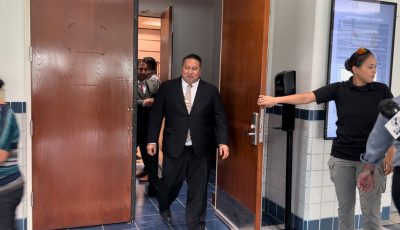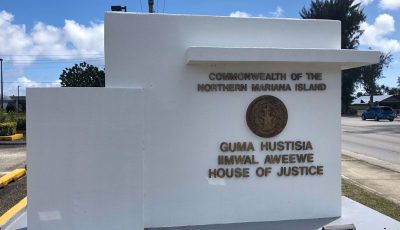High Court reverses Togawa convictions, remands for a new trial
On Oct. 24, 2016, the Supreme Court issued its decision in Commonwealth v. Erwin Togawa. The High Court reversed Togawa’s convictions and remanded the case for a new trial because the trial court abused its discretion by improperly admitting hearsay testimony and a past recollection recorded.
The Commonwealth charged Togawa with one count of assault and two counts of disturbing the peace for allegedly threatening a victim with a knife. Following a bench trial, the trial court convicted Togawa of one count of assault and one count of disturbing the peace.
Togawa appealed his conviction, arguing that the trial court erred in admitting improper hearsay evidence under NMI Rule of Evidence 803(3), improperly allowing a petition for a temporary restraining order to be read into the record as a past recollection recorded under NMI Rule of Evidence 803(5), admitting improper character evidence under NMI Rule of Evidence 404(b), and by allowing the prosecution to ask its witness improper leading questions. Togawa also asserted that even if the individual errors were harmless, the cumulative weight of the errors required reversing his conviction. In response, the Commonwealth argued that the evidence was properly admitted, that Togawa had failed to properly preserve his objections, and that even if there were errors, they did not change the outcome of the trial.
The Supreme Court first reviewed the admission of testimony surrounding the alleged victim’s then state of mind, and found that the trial court erred by allowing testimony that exceeded the limits of the NMI Rule of Evidence 803(3) exception. Specifically, the High Court determined that testimony about the alleged victim’s statements by the police officers went beyond the exception because they did not simply address the alleged victim’s state of mind, that she was scared, but the reason for that fear, because she alleged Togawa had threatened her with a knife. The court held that although testimony that the alleged victim was afraid at the time she filed her complaint against Togawa may have been admissible under Rule 803(3), any testimony pertaining to the reasons for her emotional or mental condition was inadmissible.
Next, the High Court reviewed whether the Commonwealth had adequately established the foundational requirements necessary to admit a petition made by the alleged victim as a past recollection. The court concluded that, because the Commonwealth offered contradictory dates and failed to elicit testimony from the witness that she remembered the petition’s preparation or had reviewed its contents, the trial court abused its discretion by allowing the petition to be read into the record.
Finally, the High Court considered whether these errors, when taken together, could be considered harmless, meaning they did not affect Togawa’s substantial rights. Because of the nature of the evidence, the High Court concluded that the errors could not be considered harmless beyond a reasonable doubt. As a result of these errors, the Supreme Court vacated Togawa’s convictions and remanded the case to the Superior Court for a new trial.
The Supreme Court’s full opinion is available at http://www.cnmilaw.org/supreme16.html. (NMI Judiciary)



























